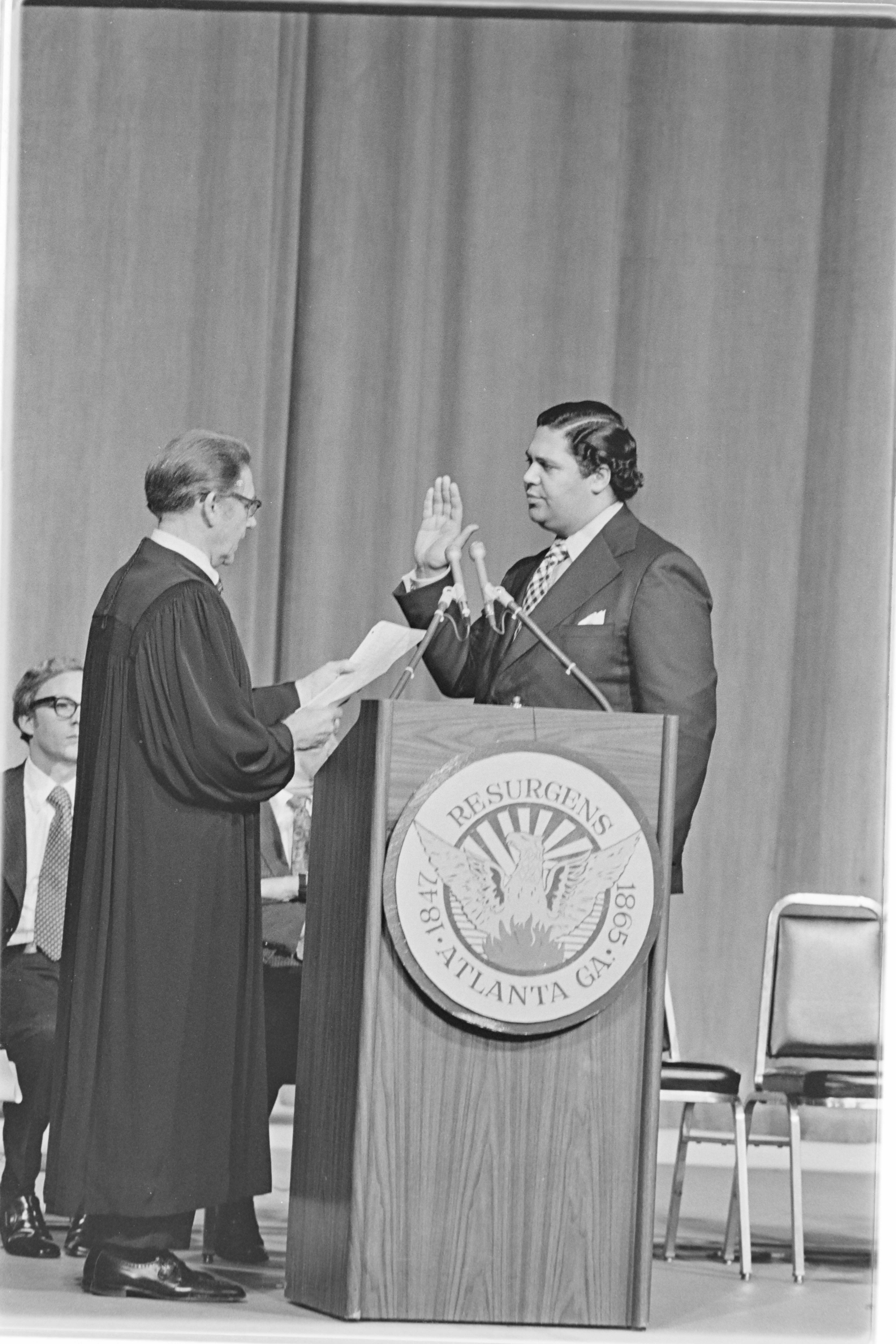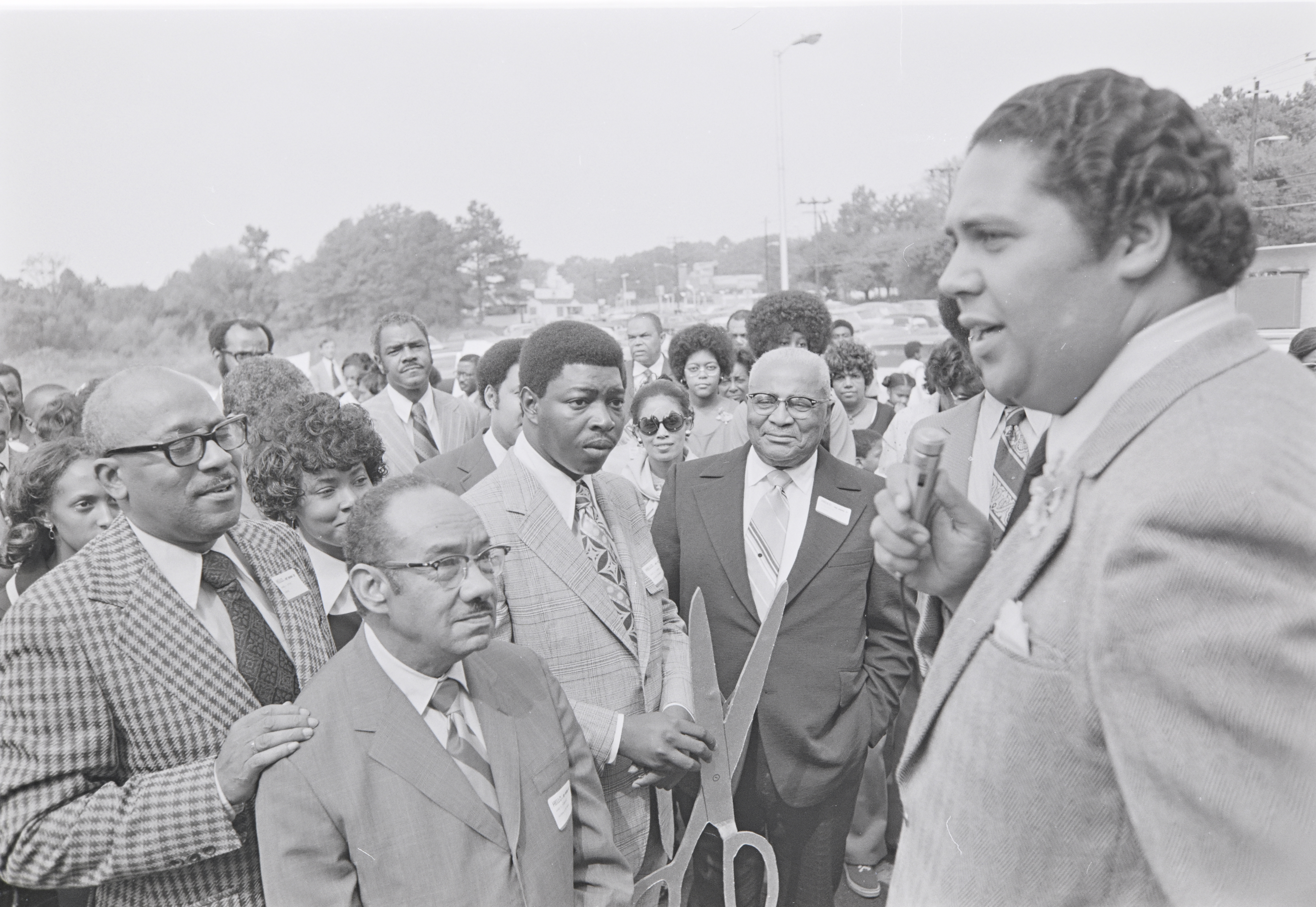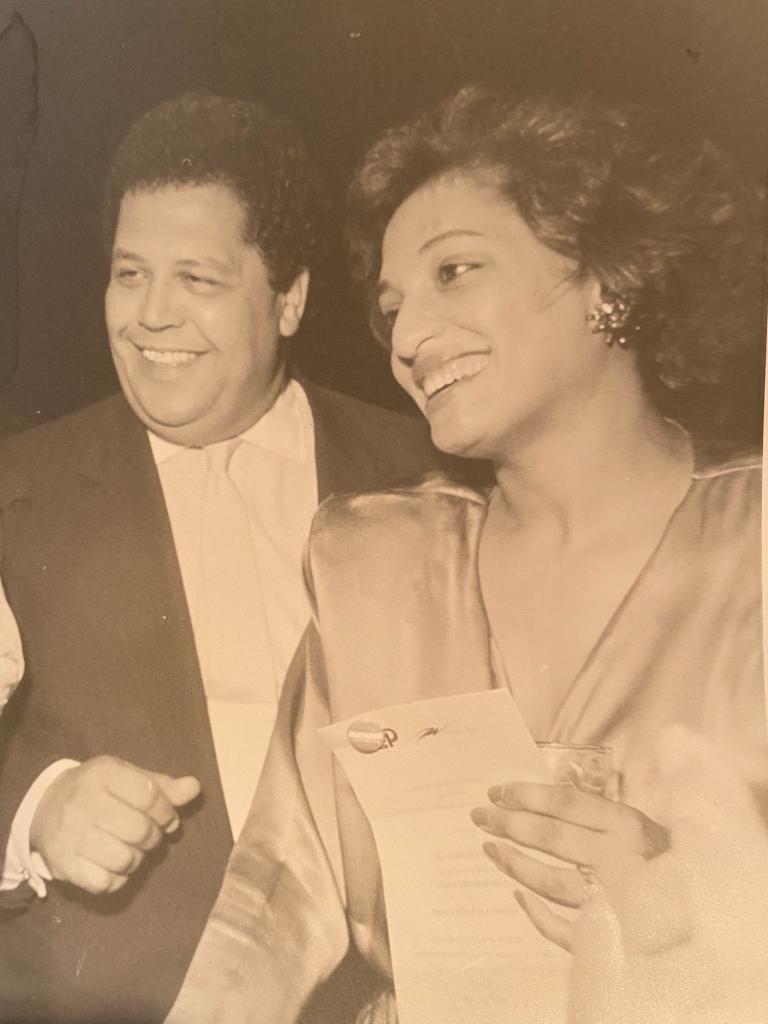
“Everyone Called Him Maynard”: On Growing Up with Maynard Jackson, From Daughter Elizabeth Jackson Hodges
Elizabeth “Beth” Jackson Hodges sat down with Ford’s Theatre to chat about the man that everyone’s talking about in Something Moving: A Meditation on Maynard: her father, Maynard Holbrook Jackson, Jr.
FORD’S THEATRE: Who was Maynard Jackson?
ELIZABETH JACKSON HODGES: Maynard Jackson was an activist, a politician, an entrepreneur, a philanthropist. He was a great dad. He was a son of Morehouse College (a very proud Morehouse man), a proud Atlantan…That’s who Maynard Jackson was.
What was it like growing up as the first daughter of Atlanta, especially during the 70’s?
JACKSON HODGES: It was an adventure and fascinating time growing up in Atlanta because I was surrounded by so many wonderful people. I was a little insulated from bad things that were happening to Black people in other cities, and in other places around the world, because I was in Atlanta. I was surrounded by Black doctors, dentists, educators, business owners and policemen. Growing up in Atlanta was like growing up on your own safe island. As a pre-teen in the ’70s and into my teenage years, I was made aware of the Civil Rights Movement and what it did to break down the racial segregation barriers through my parents, family and my neighbors.
Where were you when Maynard won the historic 1973 election?
JACKSON HODGES: Campaign night: I remember when he won the office. I remember that my Mom, grandmother, family members and I went to the Hyatt Regency in Atlanta for the campaign night celebration. I was 12 years old, but I do remember the initial roaring celebration of the crowd when Dad proclaimed that he was the next mayor of Atlanta. But after that I was shuffled off the podium and taken to our hotel room, it was bedtime for me. I didn’t get to participate in a lot of the celebrating because I was young.

Going to sleep that night, did you know things were going to change? Were you able to recognize at all how monumental this would be for history?
JACKSON HODGES: Not at all. I was not aware at the time of the many way things would change for me or my family. I don’t think I was old enough to really understand the magnitude of the moment and the trajectory of history. The next election, as an older child…I was able to recognize it, embrace it, feel it.
How did you navigate moving from protest to power?
JACKSON HODGES: I participated in many political campaigns because of my dad. I volunteered on all his campaigns, and several local campaigns. I think that was my way, as a young person, to participate in the movement as much as I could.
What was the impact of your father’s political career on you personally?
JACKSON HODGES: The effects of being the daughter of a politician were full of interesting exposures to diverse people, places and spaces, and also a challenging way to grow up, finding my identity in the spotlight. Because of the death threats that my father received, I had full-time police executive protection from junior high through high school. I had Atlanta police detectives with me all the time. Which made life very interesting! Especially in high school when you’re sort of trying to have a social life and you always have an Atlanta police officer with you. So, I was sure that all the young men who approached me must have really liked me because they had to have the courage to approach me with a big guy with a gun standing next to me! We also had executive protection at our home, with officers sitting in marked patrol cars outside our house. However, we were allowed to have friends from our neighborhood visit. Our home became a hub of activity for family and friends. I think those personal limitations on my freedom to go places alone was the biggest impact. I’m still very close to those officers who cared for my Dad and our family. We have lunch and reminisce often; these gentlemen kept me safe – and even taught me how to drive. They were like big brothers to me, they were wonderful.

Your father opened the door for many Black entrepreneurs. He was an entrepreneur himself. Can you talk about the impact your father had in creating a pipeline for businesses and generational wealth in Atlanta?
JACKSON HODGES: My father worked very hard to break down the barriers of economic exclusion and to create a level playing field in city contract procurement, in corporate boardrooms and corporate suites in Atlanta for women and minority-owned businesses. In 1974, in his first term as mayor, 1% of Atlanta’s contracts were held by minority contractors and by the time he left five years later, 34-35% of Atlanta’s contracts were held by minority contractors. It was very important to him that minority and women businesses participated in building the new airport terminal and other major infrastructure projects. His philosophy was to widen the circle of opportunity and prosperity, to include everyone in the city.
What made your dad a special dad?
JACKSON HODGES: He had a wicked sense of humor. He had a beautiful singing voice – he could really sing! What made him special in my eyes was that he required me to think outside of myself. He always told me, you know, “It’s wonderful to write a check to an organization, and organizations and charities need money, but don’t forget to give of yourself and give your time.” This was something he always insisted and encouraged me to do. To this day, I still volunteer. Giving back to your community is something that he taught me that I cherish, and I try to do on a daily basis. I try to live my life that way.

Anything else?
JACKSON HODGES: He had a habit of getting up very early in the morning to ride around the city of Atlanta with his executive protection. He’d stop at the bus stops and talk to people going to work in the mornings – the nurses, the people who cleaned hotels, the students going to school, whoever was up standing at the bus stop at five, six o’clock, seven o’clock in the morning. He’d say “Hi, I’m Maynard Jackson.” He did out of love for his city and respect for the people of Atlanta. We always had a great time on these ventures because we’d get hot Krispy Kreme donuts before our ride. Then he’d see a patch of grass that needed to be cut, and he’d call his office, “Tell someone to cut the grass on the corner of whatever street.” He’d make unannounced drop-in visits to the various city departments early in the morning – Fire Department, Public Works, Transportation – and talk one-on-one to hear firsthand what was going on inside city government. He’d say, “Tell me about it,” whatever it is, just tell me about it. He was always open to listening to people.
Everyone called him by his first name. He campaigned that way, his slogan was “Maynard for Mayor,” so everyone just called him Maynard and that put him on first-name basis with all Atlantans. People would scream out, “Hey, Maynard, how are you today?” He would wave or return the greeting. There are so many heartfelt memories of my Dad – what he meant to me, my siblings, our family, the City of Atlanta and all the people he touched and inspired.
Elizabeth Jackson Hodges is a member of the Ford’s Theatre Board of Trustees and the Host Committee for Something Moving: A Meditation on Maynard. She is the eldest daughter of Maynard Jackson. She works as an entertainment agent and tour manager for artists.
Something Moving: A Meditation on Maynard by Pearl Cleage, directed by Seema Sueko, runs September 22 – October 15, 2023. Get tickets here.


